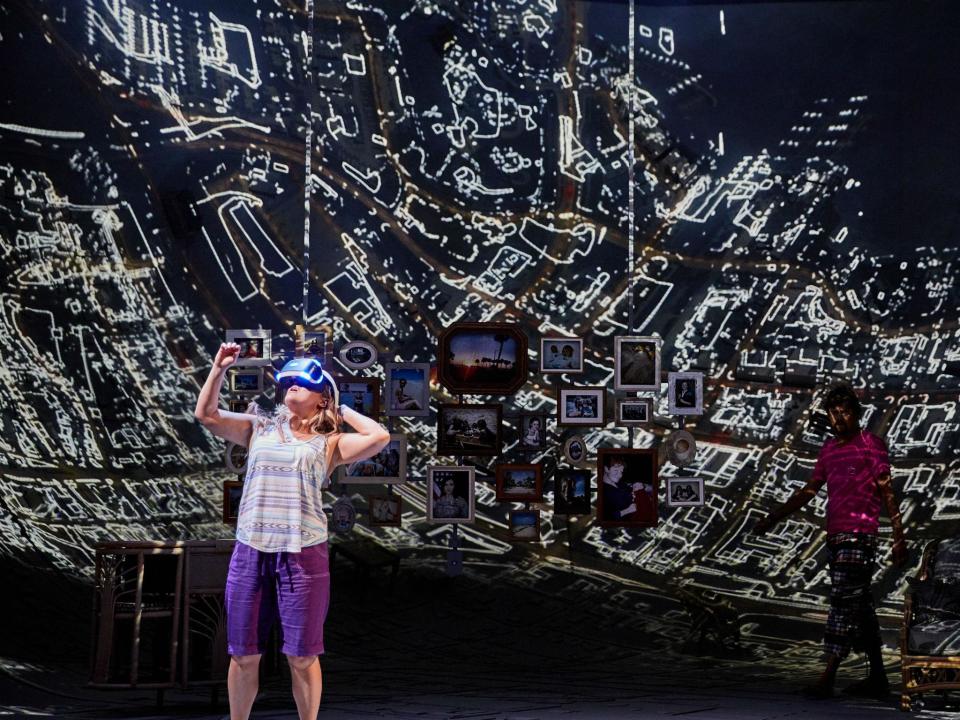Ugly Lies the Bone, Lyttelton, National Theatre, London, review: Jess is superbly played by Kate Fleetwood

Put yourself behind the virtual reality visor of this woman. You wouldn't want to be in her skin, that's for sure. In her early 30s, Jess is a war veteran. Half of her body was burned in an IED in Afghanistan. But now VR is offering techniques that can help to lessen the physical and psychological toll of reconstruction. It can distract the mind so that the body gets the exercise it needs. Now back in her home town in Florida, near Cape Canaveral, Jess takes part in an experimental programme for this VR therapy. It's agony at first even to put on the visor (it took three skin grafts to give her back an eyelid). But if she plays the game and assists them in monitoring the degree of pain as she moves her limbs, she can walk into a world of her own making.
Lindsey Ferrentino's play has its imperfections. You can sometimes imagine what its intricate matrix of themes must have looked like in black felt-tip on a white board in a workshop session. But is still a very impressive achievement. It reminded me a bit of The Nether by her fellow-American dramatist, Jennifer Haley. That, though, was sci-fi and dealt, brilliantly, with the dubious form of suffering that is being a paedophile. Ugly Lies the Bone is similar in taking technical innovation and using it to explore the harrowing pressures in reality that might well make us want to escape it. Es Devlin is another link. She's again the designer for this piece, receiving its premiere in Indhu Rubasingham's absorbing production in the Lyttelton.
I have to declare a (sort of) interest here. I'm bipolar and have read quite a bit about experiments with VR and how it can help bipolar people orient ourselves better. I haven't been brave enough to take part in one yet. With that homework in my satchel (so to speak), I wonder if some folk might wish that the play offered more New Scientist-style discussion. Or took a more straightforward “inspirational” angle. Jess is superbly played by Kate Fleetwood – each of her Tin Man movements stabbing your heart, particularly in the scene where she disrobes and, gasp by gasp, puts on a new blue dress. But I loved the way the character is no poster girl for the “moving forward” philosophy that is fed to her by the bright, soothing voice of the scientist.
Jess wants to get back to a Florida that's no longer recognisable. She has a gallows humour that sometimes put me in mind of Mae West in its quick-draw but rather drawled put-downs. Fleetwood lets you hear the pain of frustrated intelligence and disappointment. She is invited out to see the last space launch by a former boyfriend, laid off by NASA, but she suddenly goes into juddering relapse before any intimacy can be re-kindled. Besides, he's married. Ralf Little captures beautifully the endearing aspects of this would-be goofball and his shifty sense of his own limits. At moments, his tactlessness is deliberate and well-meant (the two can still share a bad-taste joke); at others inadvertent and self-serving. Telling Jess how he used to like to brush her abundant hair, he goes more than one step too far: “My wife has short hair. Makes her look like a lesbian. Or a mom”.
Everything is chequered morally. Jess dearly loves but slightly underestimates bubbly sister Kacie (excellent Olivia Darnley) who has a sappy “dream board”. “You glue on what you want from life, your ideas. So you can see it...The universe can see it too...That's how I got Kelvin.” Ugh, Kelvin, all scar-covering goatee and positive messages. But he turns out to have been under-estimated too. There are flashbacks in the storyline and flashbacks that are post-traumatically triggered in Jess. We hear why she felt she had to go to Afghanistan for that third tour of duty.
Was it to gobsmack us with the design that the NT programmed this piece in the Lyttelton rather than in the Dorfman – the more intimate space where usually normally nurture plays by challenging writers who are new to Britain. I don't want to give too much away but I felt the visual dimension here (the video work is by Luke Halls) was a bit underwhelming. We aren't ravished by hope, delusional or otherwise. It signals too obviously (in my view) that this particular “paradise” is suspect. The best sequences are those where the excellent Fleetwood seems to be caught in the eye of storm – like Lear on some technology-blasted heath. For me, it's the quality of the writing that earns Ugly Lies the Bone this happy opportunity to be seen by a wider public.

